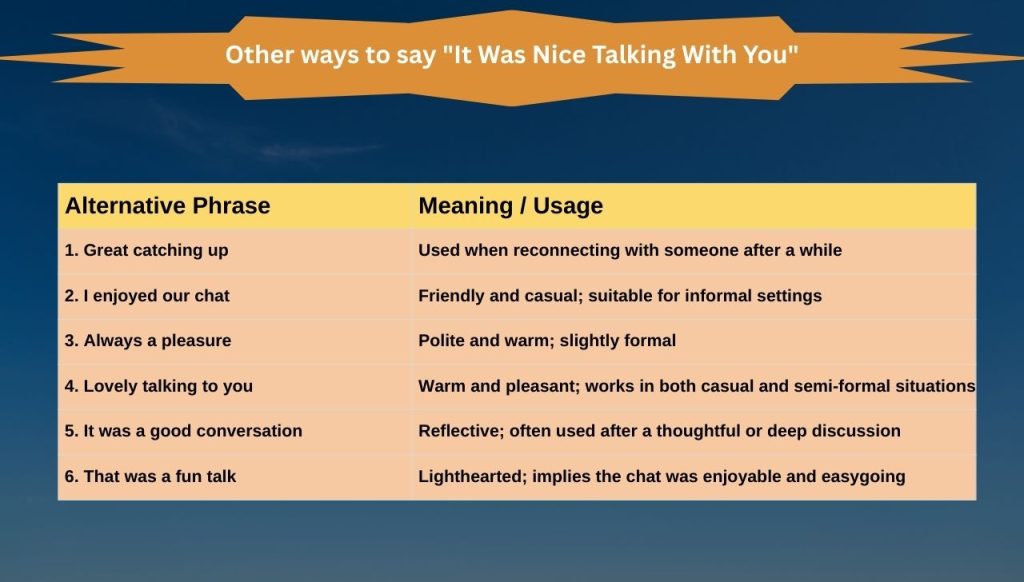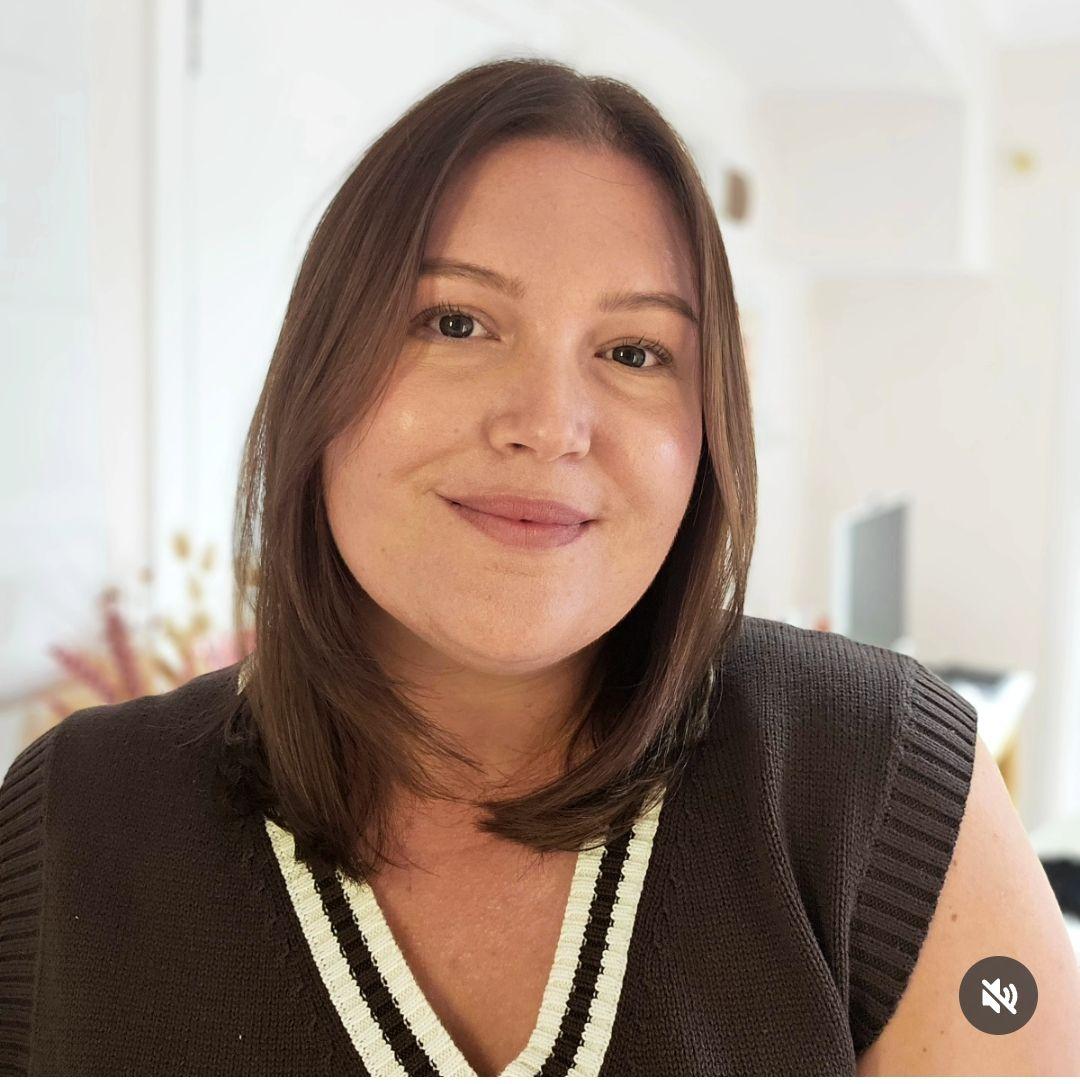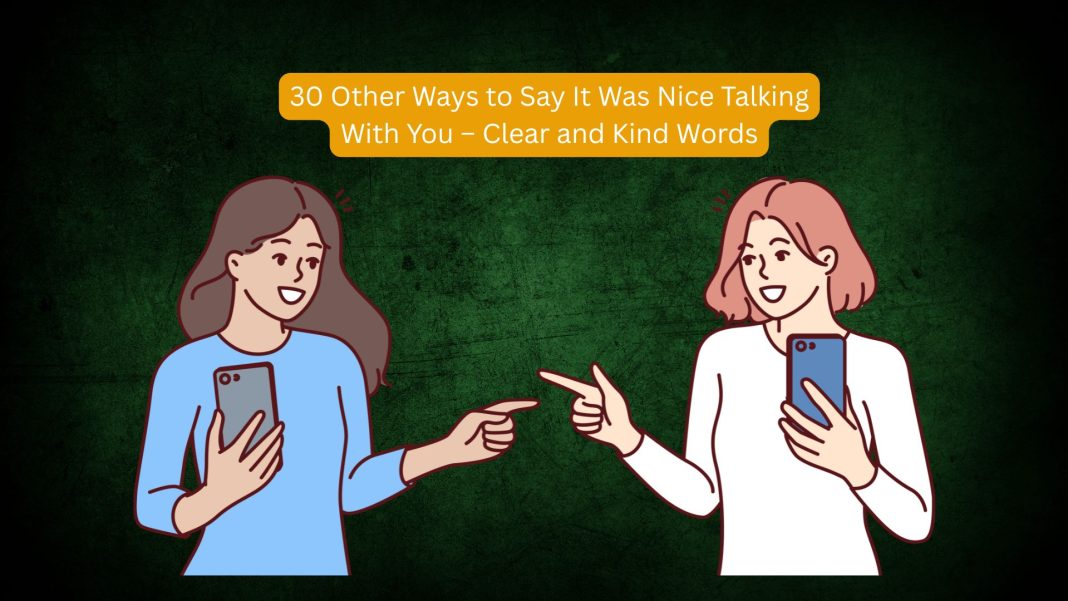Sometimes, wrapping up a conversation with a simple “It was nice talking with you” feels a bit… plain. You want to sound warm, genuine, and maybe even memorable. Finding the right words can leave a remarkable impression, whether it’s a casual chat with a friend or a professional exchange. Luckily, plenty of clear and kind alternatives express appreciation without sounding repetitive or robotic. These phrases can help you convey friendliness and respect while keeping things natural and heartfelt. Ready to explore some fresh ways to say goodbye?
“It Was Nice Talking With You” Meaning
“It was nice talking with you” — sounds simple, right? But like most everyday phrases, it carries more weight beneath the surface. On the face of it, it’s just a polite way to wrap up a conversation. But let me explain why this phrase packs a punch in how we connect.
When someone says, “It was nice talking with you,” they signal warmth and appreciation. It’s like saying, “Hey, I enjoyed our chat, and I’m glad we spent this time together.” It’s not just filler; it’s a small but meaningful social cue that leaves things on a positive note.
Think about it:
conversations can sometimes end awkwardly or abruptly. This phrase smooths that out, like a friendly handshake at the end of an interaction. It invites goodwill, even if the chat was short or casual. Plus, it’s a nice way to show respect, especially in professional or new social settings where building rapport matters.
But here’s the thing —
sometimes it can come off as a bit routine or even a bit forced, depending on the tone or context. You might catch that little disconnect when it’s said too quickly or without eye contact, as if the speaker is eager to move on rather than genuinely enjoying the talk. So, the meaning isn’t just in the words but in how they’re delivered.
Ultimately, this phrase is a small bridge that keeps human connections feeling friendly and open, even for a moment. It’s one of those little everyday kindnesses that reminds us conversations are about more than exchanging words — they’re about sharing a moment.
Does that resonate with you? Have you ever noticed how these little closing phrases shape your feelings after a chat?
When to use “It Was Nice Talking With You”
Ah, the phrase “It was nice talking with you” — simple, polite, and often overlooked, right? But knowing exactly when to drop that line can really elevate how you leave a conversation, whether it’s in person, on the phone, or even in an email. Let me explain.
You usually want to use “It was nice talking with you” right at the end of a conversation, especially when you want to signal that you enjoyed the interaction but are ready to wrap it up. It’s a friendly, warm way to show appreciation for the exchange without sounding overly formal or distant.
Think about these moments:
- After a casual chat: Whether you ran into someone at a coffee shop or caught up with a colleague, this phrase nicely closes the conversation without making it awkward.
- In professional settings: When finishing a call or meeting with a client or coworker, it’s polite and professional without being stiff. It strikes the right balance between courteous and approachable.
- When you want to keep the door open: It subtly hints that you appreciated the time spent and might be open to talking again later — like saying, “Hey, this was good; let’s do it again sometime.”
But here’s the thing — it’s not always the best choice if the conversation was tense or rushed, or if you want to be more formal (say, in official business correspondence). In those cases, something like “Thank you for your time” or “I appreciate your insights” might fit better.
You know what else? Sometimes, swapping “with” for “to” changes the vibe slightly. “Talking to you” can feel a bit more one-sided, while “talking with you” implies a two-way, mutual exchange — which feels warmer and more personal.
Why to say “It Was Nice Talking With You”
Saying “It was nice talking with you” is more than just a polite sign-off—it’s a way to show appreciation for the other person’s time and presence. It acknowledges both sides’ effort into the conversation and leaves things on a positive, respectful note. This phrase signals that the interaction mattered, even if the chat was brief or casual, making both people feel valued and heard.
Beyond politeness, it also helps smooth the ending of a conversation, easing any awkwardness and setting the stage for future connections. It’s like a little social cue that says, “I enjoyed this moment with you,” keeping the door open for next time without being pushy. In a world where conversations often feel rushed, this phrase gently reinforces connection and kindness—small but meaningful gestures that keep communication warm and genuine.

Other ways to say “It Was Nice Talking With You”
| Alternative Phrase | Meaning / Usage |
|---|---|
| 1. Great catching up | Used when reconnecting with someone after a while |
| 2. I enjoyed our chat | Friendly and casual; suitable for informal settings |
| 3. Always a pleasure | Polite and warm; slightly formal |
| 4. Lovely talking to you | Warm and pleasant; works in both casual and semi-formal situations |
| 5. It was a good conversation | Reflective; often used after a thoughtful or deep discussion |
| 6. That was a fun talk | Lighthearted; implies the chat was enjoyable and easygoing |
| 7. Good to hear from you | Often used when someone initiated the conversation after a while |
| 8. It was refreshing talking to you | Suggests the conversation felt uplifting or different from the norm |
| 9. I appreciated our talk | More thoughtful; hints at meaningful or helpful conversation |
| 10. Thanks for the chat | Very casual; great for text or instant messaging |
| 11. I liked our conversation | Slightly reflective; implies you found value in the discussion |
| 12. That was a meaningful talk | Used when the chat had emotional or thoughtful weight |
| 13. It was good connecting with you | Used in networking or new meetings |
| 14. I had a great time talking with you | Friendly and enthusiastic |
| 15. Let’s talk again soon | Wrap-up phrase that invites future conversations |
| 16. You made my day | Emotional and warm; implies the talk was impactful or positive |
| 17. I really valued our talk | More formal and serious; shows appreciation |
| 18. That was a great exchange | Intellectual or business tone; good for professional settings |
| 19. Always enjoy our talks | Ongoing relationship context; shows consistency |
| 20. That was a good laugh | Light and fun; use when humor was a big part of the chat |
| 21. I’m glad we talked | Reflective and sincere; implies it was needed or helpful |
| 22. This was really nice | Casual and warm; short and sweet |
| 23. Thanks for the great conversation | Appreciative tone; can be formal or casual depending on tone |
| 24. That was time well spent | Appreciative; implies the talk was meaningful or productive |
| 25. I’m happy we got to chat | Casual and warm; often spontaneous conversations |
| 26. It was a pleasure speaking with you | More formal; great for emails or professional contexts |
| 27. We should do this more often | Friendly; implies the chat was enjoyable and worth repeating |
| 28. What a great convo | Super casual; text or chat slang |
| 29. It felt good talking to you | Emotionally honest; implies relief, comfort, or connection |
| 30. That was a real treat | Slightly quirky or playful; shows joy or surprise |
Conclusion:
Choosing the right words to end a conversation matters more than you think. By using kind and apparent alternatives to “It was nice talking with you,” you create genuine connections. So next time you say goodbye, try mixing it up—you might be surprised how much a small phrase can brighten someone’s day.

Grammar Nerd, ESL Trainer, Low-Key Comma Crusader
Daniel has taught English for over a decade, from small community classes in Oaxaca to bustling university halls in London. He has a knack for turning even the driest grammar points into relatable, real-life language tools—think fewer red pens, more real talk. He co-founded Grammation to make grammar less gatekeeper-y and more global. When he’s not decoding sentence structures, he’s probably hiking with a paperback novel or adding unnecessary hyphens for fun.
“The rules of grammar should empower people—not trip them up.”


